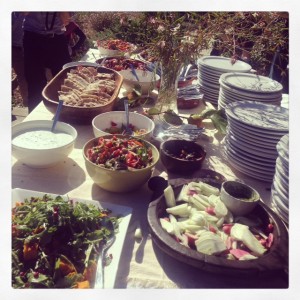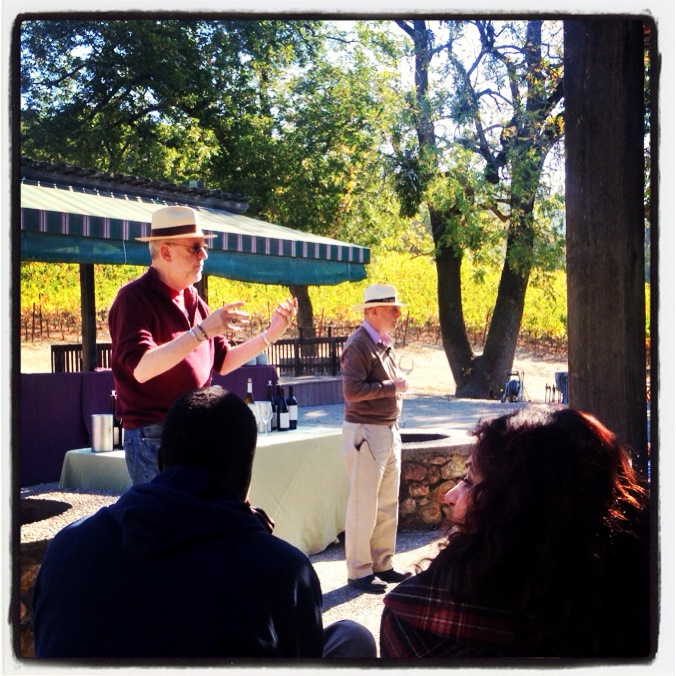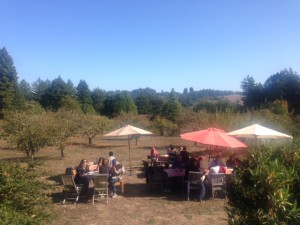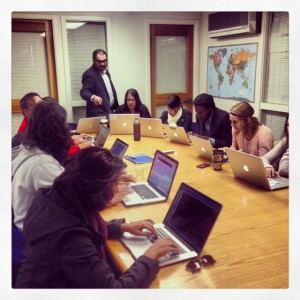Disrupt Your Life
There are a few topics that have been on my mind lately, so I am going to break things up into two posts. I will first give you an update on what’s been going on with the general fellowship activities and how I am feeling about the whole experience. My next post will be on the recent discussions around whether or not a journalist should learn to code and how that fits in with my project here at Stanford.
So, first things first. The fellowship continues to be glorious. This past weekend, we went as a group to Sonoma and enjoyed a day at the Gundlach Bundschu winery. We had an interesting presentation from winemaking expert Jim Lapsley of UC- Davis on the history and production of wines in northern California. And, we had wine, of course. And food. It was a beautiful day. During the evening, we had a lovely dinner at the Meritage in Sonoma. More food. And wine, of course. And then on Sunday, we went to Knight Fellow Martin Quiroga’s farm near the small town of Freestone. It was a lovely, idyllic day. The kids of some of the fellows had a great time running around the open spaces, and we got to see olive trees and Redwoods. The meal there was just incredible, as Martin’s wife, Leah, is a former chef at Chez Panisse, the famous French restaurant in Berkeley. It was just a perfect weekend.

Just when we thought the weekend couldn’t get any better, we had a gourmet meal in the beautiful outdoor setting.
Back at Stanford, it’s a little hard to believe that the students are already taking midterms. After this week, we have three weeks before Thanksgiving (off from classes all week), then a short week before students take finals. Since I am auditing classes, I don’t get to experience the joy of exams, so I am going to use these lull periods to catch up on some topics and get some work done on my project.
Last week, I met up with Arvind Satyanarayan, who is a Stanford doctoral student. He is working on a data visualization platform called Lyra, and it was great to talk to him about the opportunities for getting these skills into the hands of journalists and students. He has been part of the Stanford Data Visualization group, which is at a bit of a standstill since Jeffrey Heer moved to University of Washington.
I also visited Berkeley last week and had a great time sitting in on some of their progressive courses in the programming and data realm. Jeremy Rue teaches a Coding for Journalists course and Shan Carter and Kevin Quealy of The New York Times teach a Data Visualization course.
As a matter of fact, Shan came a little late to class, because he was finishing up work on the wonderful new NYT project A Game of Shark and Minnow, that is receiving a good deal of attention for both its content and presentation. This visit gave me some food for thought and got me taking some more aggressive notes on my project, which I will discuss in the next post.
I was following the hashtag on Twitter for the NewsU webinar today on Six Things Educators Can Do Now to Go Digital. I saw a few people tweeting on the idea that it is good to go to meetups and workshops on topics in which you know very little. I have often told my students that it’s better to be the “stupidest” person in the room than the smartest. That sounds a little extreme, and I use the word “stupidest” for effect. It may even seem a bit counter-intuitive. But when you know the least, that’s when you have the most potential to learn. I think this is a particularly difficult task for faculty to execute, not being comfortable in situations in which one is not the expert.
I’ve been thinking lately about how I actually “put my money where my mouth is,” by coming to Stanford for this fellowship. Switching up my role from professor to student, moving across the country, taking classes in one of the most prestigious computer science programs in the country, dropping myself in the heart of Silicon Valley … I’m not going to lie. It’s been a bit intimidating and overwhelming at times. This is all very different than my existence as a professor at Texas State and an Austin resident. I miss Austin, where, like Cheers “everybody knows your [my] name.” (Not really, but I definitely have a network of friends and contacts that I shouldn’t take for granted). But I have given myself a gift of time, learning and perspective, and am so grateful that I have this opportunity.
And, I’m sure I’m not the only one feeling this way. We have people in the group who have moved from Europe, Asia, the Middle East and South America, in some case, people for whom English is not their first language. We have people from across the US who have relocated families and quit jobs. The overwhelming nature of what I am feeling must be exponentially affecting them, their spouses and children. Luckily my cat seems to be settling in quite well.
A fellowship is a great change of pace and a fantastic opportunity. But it can also disrupt what is familiar and comfortable. Disruption is a buzzword in industry discussions these days, and there is often talk about disrupting academia or the curriculum. To disrupt something is to interrupt or drastically alter it. The Internet is often to blame for the disruption of the news and music businesses. And for years, it’s been the cause of disruption for me, being driven to change careers, study its effects and now push myself even further in my ability to understand broader implications to how we communicate.
I could have stayed in the comforts of Austin with my nice professor job at Texas State. But I know the benefits of this “disruption” will pay off in the long run for myself, my program and my students and hopefully for the journalism profession at large. I hope that my networking reach on the West coast will be improved and that I can use this time to move curriculum forward with advanced topics that I never really had the time to effectively explore when I was working full-time. It’s also a good example to set for students, that learning never stops, no matter who you are, how far you are into your career, how many degrees you have, how old you are. Learning is fun. It’s what life is all about. And like many things worth doing, it can be scary and time-consuming.
Now, with all this said, I do have to add that sometimes it’s just fine to attend things where you are already skilled or might be considered an expert. Particularly as an instructor, I am finding it helpful to visit classes that teach some of the same topics I teach. I am very interested in different approaches and in filling in any blanks in what I know on these topics, as I am mostly self-taught in all my technology skills. Stanford professors are top-notch, and I have really learned a lot from their mix of humor and brilliance in communicating with students. I am reminded that I can also do this when I return to Austin, that I should try to sit in on other professors’ classes when I can, at Texas State and UT. And, in turn, I would love for others to sit in on my classes.
So, while change is good, disruption is expected and putting yourself in uncomfortable situations for an hour, day or year can reap amazing benefits, it’s ok to look for those things that provide comfort, reinforce and validate what you already know and remind you of why you are stepping out of bounds in the first place. All things in moderation.
Stay tuned for my next post, where I tackle some of my thoughts on teaching journalists to code.


